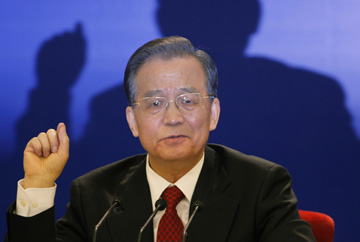Chinese journalists are speaking out more often to protest attacks, harassment, and arrests. The discussion of press rights—and the central government’s stance—may foretell the future of broader reforms in China. A CPJ special report by Madeline Earp
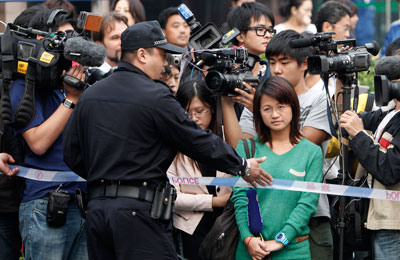
Published October 19, 2010
BEIJING
Fang Shimin, a prominent science author and blogger, was vacationing in Fujian province in June when he received an urgent text message: A journalist with whom he collaborated had been beaten in Beijing by assailants wielding iron bars. Fang Shimin immediately turned to his Sina micro-blog to publicize the attack, which he believed was retaliation for his colleague’s investigative reporting.
“Without the Internet, news of the attack would have been very limited,” said the colleague, Fang Xuanchang, a science reporter at Beijing-based Caijing magazine. A nasty abrasion still visible above his left ear when he met with CPJ in July, he said Fang Shimin’s publicity was important in prodding police to undertake a genuine investigation. “The day after it happened, it was already a public affair. That’s when police began to take it seriously. I realized afterwards that letting everyone know had spurred them to investigate.”
More in this report
• 中文
• Video: Newsroom confrontation
More on China
• Full coverage
• CPJ Blog: A call to end censorship
• Database of imprisoned journalists
Police in Beijing arrested four suspects in September, although not before Fang Shimin was himself assailed by two men who sprayed him with a chemical substance. A Wuhan urologist allegedly orchestrated both attacks in reprisal for a 2005 investigation by the Fangs that he believed had thwarted a potential academic appointment, the official Xinhua news agency reported.
Journalists in China are increasingly willing to speak out on behalf of their colleagues, publicly condemning physical attacks, harassment, and arrests, a CPJ examination has found. Interviews with more than a dozen journalists, lawyers, and analysts, along with a review of five recent cases, point to a journalism community asserting the principle of press rights—if not press freedom—and finding at least limited success. Along with arrests in the Fangs’ case, a journalist in detention was freed, an arrest warrant against a reporter was withdrawn, and a top corporate executive issued an apology after a confrontation with a newspaper—each time after journalists publicized the cases.
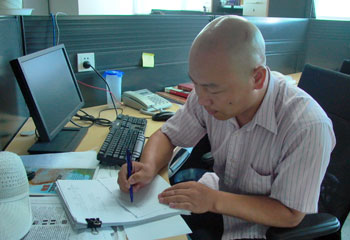
“Organized acts of protest by journalists remain unusual, but reports on journalists’ rights are increasing,” said Zhan Jiang, a professor in the International Journalism and Communication Department at Beijing Foreign Studies University and well-known media analyst. Online outlets and digital methods have been crucial in the emergence of press protection as an articulated issue.
Still, there are significant limits. Even as discussion of press rights gains momentum, censorship remains strong; the government severely restricts direct challenges to central authority or the Communist Party, along with coverage of sensitive national topics. Wang Keqin, an acclaimed investigative reporter for China Economic Times, told CPJ “there was a big fall-off in reporting freedom in 2008 and 2009” because of the Olympics and the 60th anniversary of Communist Party rule.
And the same state restrictions that prohibit journalists from covering sensitive topics such as ethnic unrest have effectively kept reporters and editors from speaking out on related anti-press abuses. Chinese journalists, notably, have not reported on the case of Gheyrat Niyaz, editor of the Uighurbiz website, who was sentenced in July to 15 years in jail on antistate charges related to his comments on the 2009 ethnic violence in the far-western Xinjiang Uighur Autonomous Region.
Digital methods amplify message
The interplay between digital and traditional media has enhanced the reporting of press violations, as evidenced in the aftermath of a July fracas at the National Business Daily’s Shanghai bureau.
Prompted by the paper’s report that the government was investigating the safety of its products, a BaWang International shampoo sales representative and three associates arrived at the bureau, banging on the doors and pushing their way into the office. The incident, part of which was captured on video, led to a handful of minor injuries. National Business Daily responded assertively, publishing a special online section documenting the confrontation—included the video, images of the BaWang contingent, a comments section, and more than 30 links to related articles and analysis from Daily staff and other national papers.
Both BaWang and the Daily issued statements on Sina micro-blog accounts, which were themselves posted on the website of the Guangdong-based Southern Metropolis Daily and translated into English by the Hong Kong-based EastSouthWestNorth website:
@Bawang Shampoo 18:23 We were very shocked to read about this news on the Internet … We greatly respect the right of the media to make objective reports.
@NBD 19:14 Our newspaper strongly condemns provocative methods to threaten [reporters’] personal safety, interfere and interrupt the normal order and operations of newspapers

The coverage seemed almost disproportionate to the insult, but it caused BaWang CEO Wan Yuhua to apologize in person at the bureau on August 5, according to local news reports.
The same week, journalists responded forcefully in another corporate-related episode. On July 23, police in southeastern Zhejiang province issued an arrest warrant for a reporter for the Beijing-based Economic Observer on charges of damaging the reputation of paper manufacturer Zhejiang Kan Specialty Material Company in a series of stories alleging insider trading. The company denied any wrongdoing, according to news reports. The journalist, Qiu Ziming, went into hiding but stood behind his reporting in posts to his Sina micro-blog.
The paper was quick to comment. “We are deeply shocked that our reporter Qiu Ziming has been listed as a wanted criminal due to engaging in standard news reporting,” a statement on its English- and Chinese-language websites said. “We’re committed to using all legal means to defend the legitimate right of the media and journalists to conduct interviews and engage in reporting.”
By July 29, police had revoked the warrant and apologized, according to local news reports. The website of the General Administration of Press and Publication, the state agency responsible for regulating Chinese print media, posted an article by its own news outlet, China Press and Publishing Journal, that supported reporters’ rights: “News organizations have the right to know, interview, cover, criticize and monitor events regarding national and public interest. Journalistic activities by news organizations and their reporters are protected by law,” according to a translation by the English-language edition of the Communist Party organ People’s Daily.
The results, while positive, have also been limited. A police investigation into Qiu Ziming’s reporting continued even though the warrant was withdrawn, according to the London-based Financial Times. BaWang’s apology was significant, but the serious accusations underlying the attack were made not by the National Business Daily, but by Hong Kong-based Next magazine, which alleged company products contained a carcinogen. (BaWang disputes the Next report and has filed suit for defamation, according to news reports.)
Press rights: A trend with limits
Many Chinese journalists describe the trend as broad but incremental. Media analyst Zhan said journalists speak less in terms of “press freedom,” with its connotations of Western-style democracy, than “rights.” In his department office, on a campus deserted for summer vacation, he said, “We don’t speak in terms of ‘freedom,’ because that word”—he switched to English for two, emphatic words—“highly sensitive!” Shifting back to Chinese, he continued: “What do we say instead? Media rights. It means the same.”
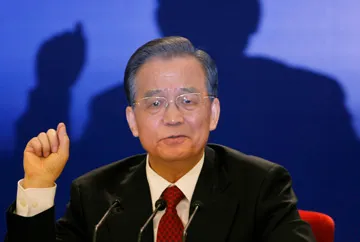
Some of the central government’s recent positions have seemed to encourage press rights in limited spheres such as coverage of business and local issues. A 2008 national ordinance on open government information has enhanced the climate for public scrutiny, Zhan and others say. The ordinance—which categorizes government information open to the public and sets procedures to obtain it—took effect after China’s premier, Wen Jiabao, proposed it in the State Council, a central agency more open to his influence than the propaganda department, a Communist Party stronghold. While yet to make extensive use of the ordinance themselves, journalists have reported widely on citizens’ information requests, and have engaged in a vigorous debate about official transparency, according to Hong Kong University’s China Media Project.
The government also appeared to promote media rights in the April 2009 “National Human Rights Action Plan of China,” developed for the country’s periodic review by the U.N. Human Rights Council. The plan stipulates that a journalist’s “right to conduct interviews, right to criticize, right to produce commentary, and right to publish” are protected by law. State media have echoed this language: “Government must lead the way in establishing respect for the media’s right to investigate and right to conduct interviews,” said an August 2 online People’s Daily editorial.
But critics say such assertions are generated for show, as a way to dilute criticism of human rights violations such as the imprisonment of at least 24 journalists nationwide. The creation of narrow, state-sanctioned press rights benefits the Chinese government, they say, by providing a limited outlet for journalists’ concerns while diverting criticism and advocacy away from its own policies of information control. As long as the government continues to censor and persecute its critics, they say, its statements about rights are empty.
“The Chinese government has long claimed to respect people’s rights—not human rights but citizens’ rights, which are rights that the state grants in its constitution and defines in its laws, rather than those that have their own existence and can’t be infringed,” Andrew Nathan, a China specialist and political science professor at Columbia University, told CPJ. “In the eyes of the regime, there is no contradiction between asserting those rights and maintaining that it’s the duty of journalists to serve the party, to obey the instructions of the Party Propaganda Department. All in all, the concept of ‘rights’ the Chinese government is using is one that perfectly well allows them to have an action plan to improve the protection of these rights, without intending in any way to weaken the Party’s monopolistic grip on power.”
That grip is reflected in the fact that journalists cannot organize their own, independent professional organizations. Civil society groups must have the sponsorship of a government agency to register to operate in China. What’s left then is the All China Journalists Association, an organization founded by the Communist Party. The association speaks out when journalists are attacked, but its political status effectively prevents it from taking an active role in defending its members. In interviews with CPJ, journalists’ opinions of the association ranged from indifference to derision.
Government control also extends to the very definition of a journalist. Only those working for officially recognized media—and every outlet must be sponsored by a state entity—are considered journalists. State censorship bars official media from tackling issues that challenge the Communist Party or central government, driving discussion of these issues onto overseas or unofficial local websites. These “unofficial” online commentators are very vulnerable: Most of the 24 journalists imprisoned in China when CPJ conducted its annual census on December 1, 2009, had published their work online, and high proportions were ethnic minorities or activists perceived as a threat to Communist Party rule.
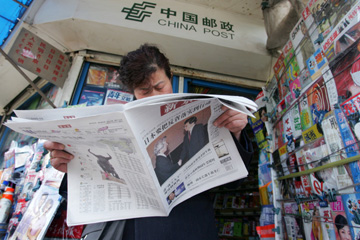
Zhan, the media analyst, cited another inconsistency between state rhetoric and practice. He and others point out that that while Wen and central government leaders have issued more liberal regulations and statements, they have not pushed for laws in support of press rights because to do so would directly challenge the propaganda department and, by extension, the Communist Party itself. “China has instituted many, many laws in the last 30 years—a transformation, and a good one—but not about the media,” Zhan said. “Instead they issue regulations. They know if there was a law, the propaganda department would lose legitimacy.”
All that said, many journalists, even those who have suffered directly as a result of their work, said press rights are stronger than they once were. “Awareness of press freedom and the Western concept of openness are growing all the time,” Fang Xuanchang said.
“Wen Jiabao is starting to look at history and how it will judge him,” added Li Datong, who edited the China Youth Daily supplement Freezing Point until his 2006 dismissal over a controversial article. “He’s the only top leader who will speak his mind on things like democracy, freedom, human rights, universally recognized values. But he doesn’t have the power to change the system.”
Protests that push boundaries
In recent months, Chinese journalists have undertaken two organized protests that push the boundaries of what the government allows. Each case involved letters of complaint published publicly online. As in the BaWang case, the breaches of professional rights were relatively small scale. But their authors included references to broader, systemic threats to their rights, allusions that implicate government officials. Censors restricted debate on each letter, but their impact within the industry was significant.
The first protest was rooted in the events of June 19, when the vice squad in southwestern Chongqing city stormed a nightclub with suspected links to prostitution. The bust was part of a high-profile, anti-crime campaign led by Chongqing Communist Party Secretary Bo Xilai, a former commerce minister eyed for promotion to the party’s highest ranks. Five days later, the Beijing-based Economic Observer, citing anonymous sources, said that a Chongqing Morning Post staffer was in state custody for discussing the political backdrop for the raid in online forums.
The prospect of punitive measures concerned many Chinese reporters, who commonly discuss such political background online—or relay it to other online commentators—because propaganda regulations bar them from reporting it through their traditional media outlets. The Post denied police were holding any employees—even threatening to take legal action—but the Beijing News, citing the Chongqing public security bureau, later reported that two Post journalists, Chen Songbo and Jiu Jinyi, had been released after questioning, and one website employee, Liao Yi, was still under investigation.
More than 100 journalists, academics, and others—one a government consultant—soon signed an online protest letter to the Chongqing Morning Post. The letter’s message was oblique, to minimize possible retribution: It takes issue not with police for detaining a colleague, but with the Post’s failure to back its staff, either by publicizing the inquiry or responding openly to requests from media colleagues. Despite its indirect approach, the letter carries a clear message about the need to assert journalists’ rights. “Under the current system, it is difficult indeed to find restitution for violations of our rights and interests,” the letter said, according to a China Media Project translation. “However, we can still express our positions in a personal capacity. We can decide to stand up and protect ourselves.”
Many believe its impact was direct. “The journalist was released after the letter was published,” Zhan said. “The protest had an effect.” CPJ spoke with three journalists who signed the open letter. Each asked not be singled out by name because the point of signing was to speak as a group. “They can’t punish everyone,” one pointed out. While editors were told not to publish news about it, another said, they weren’t told not to sign.
The letter harked back to another protest, just a few months earlier, which also used the language of “journalists’ rights.” On March 7, outside sessions of the National People’s Congress and the Chinese People’s Political Consultative Conference in the capital, a journalist asked Hubei Gov. Li Hongzhong to comment on Deng Yujiao. It was a politically sensitive question: Deng, a Hubei waitress, had pleaded self-defense in May 2009 after fatally stabbing a local official who she said tried to sexually assault her. Deng became an online symbol of opposition to tyranny and was eventually freed without punishment by a local court.
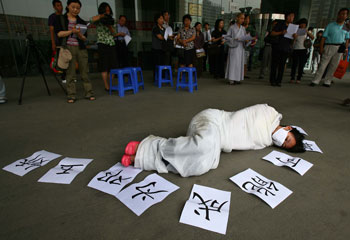
To the question, Li responded belligerently (“Who do you work for?” he demanded) and stalked off with the reporter’s recording device. Within days, more than 1,000 journalists and academics signed an online open letter to the National People’s Congress, casting the affair as a breach of professional rights. “Snatching [the device] victimized not only the reporter herself,” it read, according to a translation by the China Media Project. “It was a setback for the rights of the media, and the public’s right to know.” The authors connected the incident to graver violations during the Deng case, when Hubei leaders “drove reporters away, beat them, put them under surveillance, trampling on the rule of law to cover up their own official misdeeds.”
Li declined to apologize in subsequent local news interviews. Censors limited debate in the mainstream media: Caijing articles, including one citing condemnations of Li by a former People’s Daily deputy editor and a former propaganda department news director, were removed from its website, according to The New York Times. Despite the censorship efforts, online cartoons mocking Li proliferated. A Web user designed women’s t-shirts bearing the slogan, “Don’t snatch my recording pen,” according to the U.S.-based news website China Digital Times.
Besides raising public awareness, journalists told CPJ, the two letters helped build collective feeling in the media. Journalists said they were optimistic that a message had been conveyed to colleagues and their employers. When a reporter is in trouble, one said, “The worst thing the newspaper can do is be silent. It’s essential to speak openly and encourage others to do the same.”
In a sensitive case, media silence
Yet news media silence is exactly what greeted the arrest of a Uighur website editor. On July 23, a court in western Urumqi, capital of the predominantly Muslim Xinjiang Uighur Autonomous Region, sentenced Gheyret Niyaz, editor of Uighurbiz, a Chinese-language website focusing on Uighur issues, to 15 years in jail for endangering state security. Niyaz, a moderate editor who does not advocate for an independent Uighur state, was arrested on October 1, 2009, in the aftermath of regional ethnic violence, which he had covered online and spoken about in interviews with foreign media. Prosecutors presented articles he had written as evidence during his trial, according to The Associated Press.
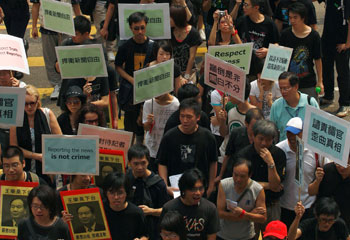
The conviction was too sensitive to be reported in the mainstream media or to garner support from the professional journalism community. The All China Journalists Association was silent. Even in Hong Kong, observed Ying Chan on the China Media Project website, “most of the reports on the Niyaz case have come from online media and blogs, from Western human rights groups, and from foreign media.” From within China, a group of outspoken lawyers and scholars published an open letter in Niyaz’s defense on overseas websites: “We believe that charging Niyazi and others with speech crimes violates the constitutional promise that “the state respects and guarantees human rights,” according to a translation published by Chinese Human Rights Defenders, an international advocacy network.
Six days after Niyaz was sentenced—just as journalists were winning skirmishes over Qiu Ziming’s detention and the BaWang confrontation—an Urumqi court sentenced three more Uighur website managers to jail terms of three to ten years for endangering state security, according to the advocacy group Uighur American Association, attributing the information to the brother of one of the men. As is often the case in such proceedings, the court did not publicly confirm the sentences. The cases went virtually unreported in domestic news media.
Because these Uighur editors do not work for officially recognized media, the government does not recognize them as journalists. Some Chinese journalists are grappling with this fundamental idea of who is a journalist, and whether journalism should extend beyond the official media. “As long as press cards are issued by the state and newsgathering activities are limited to those who hold them … regular people outside the media who conduct interviews and news reporting are totally blocked,” a Southern Metropolis Daily column pointed out on August 2.
But an expanded definition of journalism is tied to the broader issues of political reform.
Like media rights, political reform is frequently debated in the Chinese media, which take their cue from political leaders. In one recent example in August, during a speech marking the 30th anniversary of the founding of a special economic zone in Shenzhen city by Deng Xiaoping—a milestone in China’s economic development—Wen Jiabao spoke of the need to “promote political system reforms” as well as economic. Those political reforms must “protect the peoples’ democratic and legal rights,” he said, according to local news reports.
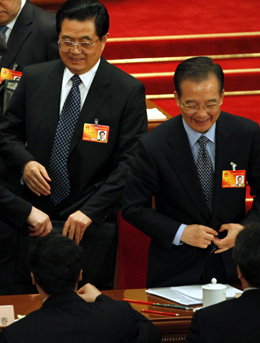
The China Media Project at Hong Kong University has been tracking political reform and its relationship to journalism. Some journalists have said the press, by reporting on Wen’s speech, can advance the overall debate on reform, a process commonly called “seizing a pretext,” the Media Project noted. One commentator, according to the Media Project, wrote: “Regardless of what Wen’s real meaning is, we can use this opportunity to talk about what we mean. Those who are courageous, speak directly. Those who are more fearful, speak as a response to Wen’s talk.”
The Communist Party’s 18th National Congress, when current leaders, including Hu Jintao and Wen Jiabao are expected to retire, is expected in fall 2012. Some journalists and analysts look to the next generation of leaders to turn promising rhetoric into institutionalized reforms. Many others are unconvinced that new Communist Party leaders will ever undertake meaningful, legal reforms that would reduce the central government’s authority.
An indication of what may happen may be seen in the months ahead. Party leaders can create conditions favorable to broad political reforms by allowing journalists, now, to report and editorialize freely. By promoting a mere façade of press rights while still heavily restricting the media, they would send a very different political signal, one that promises reform only on terms that will preserve the party’s authority.
Madeline Earp is senior research associate for CPJ’s Asia program.
